Index relies entirely on the support of donors and readers to do its work.
Help us keep amplifying censored voices today.
[vc_row][vc_column][vc_single_image image=”100664″ img_size=”full”][vc_column_text]Celebrate the start of summer with cocktails and debate at Index on Censorship’s summer magazine launch. In the underground bar of Shoreditch’s quirkiest arts venue, The Book Club, we explore how holidaymakers’ utopian image of balmy beaches and crystal clear waters contrasts with the reality of freedoms under threat.
Join Vicky Baker, a BBC World news journalist and travel writer, in conversation with Meera Selva (former foreign correspondent reporting from Nairobi, Singapore and Berlin), Benji Lanyado (founder of the Picfair photo agency and travel writer for the New York Times) and Harriet Fitch Little (Dream Jobs series writer for the Financial Times’ travel section and former editor for local press in Lebanon and Cambodia), for a debate on whether journalists are not telling the whole story about some of the world’s favourite destinations. The event will be introduced by award-winning Index on Censorship magazine editor and former travel writer Rachael Jolley.
Index’s latest magazine Trouble in Paradise reports from Malta to Mexico, Pakistan to France and Hawaii to Sri Lanka. Also in the magazine, we interview Victoria Hislop and Ian Rankin.
There will be cocktails on arrival and possibly the odd palm tree.
With thanks to our sponsors Sage and venue partner The Book Club.
Please note, capacity is limited so please register to secure your ticket. We operate a waiting list, so please let us know if you no longer want to use your ticket.
If you have access requirements, please contact: [email protected].[/vc_column_text][/vc_column][/vc_row][vc_row][vc_column][vc_column_text]
[/vc_column_text][/vc_column][/vc_row]
[vc_row][vc_column][vc_column_text]
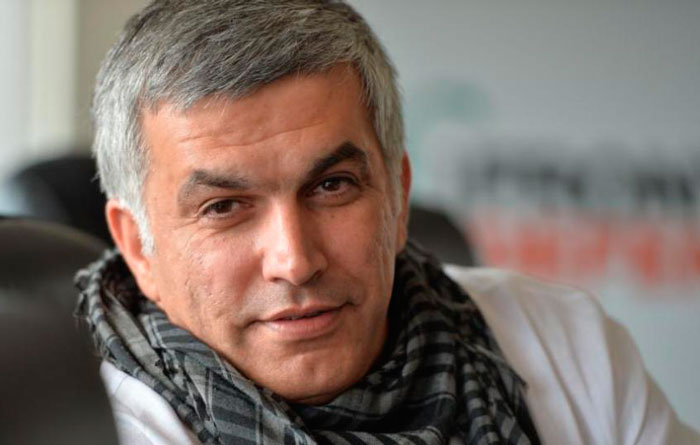
Human rights activist Nabeel Rajab has been subjected to ongoing judicial harassment.
Bahrain’s High Criminal Court of Appeal has upheld a five-year conviction for human rights activist Nabeel Rajab for critical tweets made from his account condemning Saudi-led airstrikes in Yemen and condemning the use of torture at Bahrain’s notorious Jau Prison.
Rajab, the president of the Bahrain Center for Human Rights and an Index on Censorship Freedom of Expression Award winner, has been sentenced in all to seven years in prison across two separate trials. In February 2018 he was sentenced to five years in prison for tweeting, which was added to a two-year conviction in June 2017 for “broadcasting fake news” relating to television interviews he gave in 2015.
Rajab has unsuccessfully appealed these convictions on four occasions and is expected to pursue a fifth and final appeal at Bahrain’s Court of Cassation.
Index on Censorship condemns the imprisonment of Rajab and the relentless harassment and intimidation the high-profile activist has seen since his involvement as a peaceful activist during the Bahrain uprising in 2011, during which time he has been in and out of prison on numerous occasions. He has been in prison on a continual basis since June 2016, during which time his health has deteriorated significantly.
“Nabeel Rajab is being persecuted by Bahrain for expressing his opinion,” Jodie Ginsberg, CEO of Index on Censorship, said. “Opinions are not crimes. The authorities should release him, and Bahrain’s allies – including the UK – should be advocating at the highest levels for his release.”
[/vc_column_text][/vc_column][/vc_row][vc_row][vc_column][vc_basic_grid post_type=”post” max_items=”4″ element_width=”6″ grid_id=”vc_gid:1544788614577-2ce74342-8c21-6″ taxonomies=”3368″][/vc_column][/vc_row]
[vc_row][vc_column][vc_column_text]
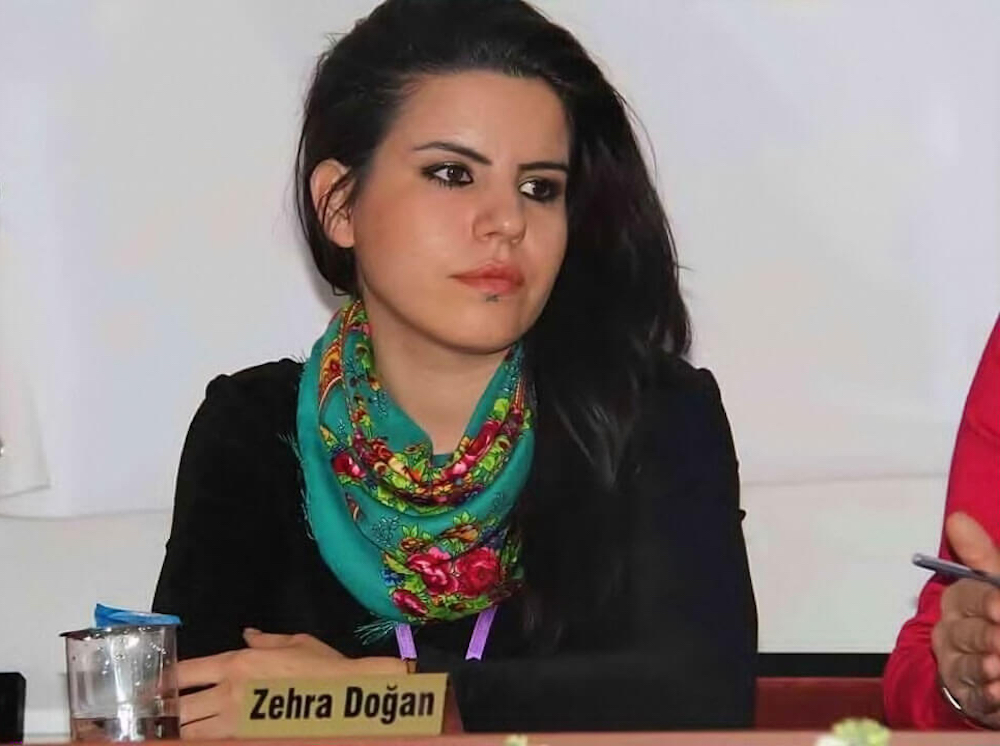
Kurdish artist and journalist Zehra Doğan
The last time Onur Erem and his girlfriend Zehra Doğan, a Turkish artist and journalist, met face-to-face, she was chirpy and seemed happy, he recalls. They sat at a picnic table and talked about her art being concurrently exhibited in various places around the world, from New York to Europe. They were surrounded by other families, busily conversing amongst each other at the picnic tables to their left and right.
But this was no picnic. Two prison guards walking up and down the aisle in between two rows of tables screwed to the concrete floor, eyeing the prisoners and their families with forced indifference masking wariness, made sure no one lost sight of the fact.
“She was in good spirits,” Erem says, attributing it to her continuing to create art while in prison, just like she did on the outside, before her sudden arrest as she was awaiting the outcome of the court case against her on charges of spreading propaganda in favour of a terrorist organisation.
“She writes down the stories of the people she met there. Since there’s not much in terms of the supplies on the inside, she uses the dyes that she makes from food. They don’t give her canvass, so she draws either on clothing or envelopes from the letters she receives. She collects the bird feathers that fall in the prison yard and makes improvised brushes out of them,” he explains.
The reason for Doğan’s incarceration was the drawing she made while covering the Turkish military operation in the town of Nusaybin on the border with Syria, populated mainly by Kurds. The drawing was made based on the photograph that had previously been circulated widely by the Turkish military on social media, according to press reports and Erem. The point of contention is whether the original photograph did or did not include the flags of the Turkish Republic hanging from buildings half-destroyed during the operation.
“She drew a military vehicle in the form of a scorpion. I’d say, this was her only addition to the photograph itself,” he says explaining that the military vehicle his girlfriend depicted in such a manner is referred to as “Akrep”, the Turkish word for a scorpion. “However the judge, in spite of all the evidence presented, sided with the opinion that the photo was taken by Zehra herself, that the original photo didn’t contain the Turkish flags hanging from the destroyed buildings and that [she] added them on for propaganda purposes, and thus, by way of this picture she was engaged in a propaganda on behalf of a terrorist organisation.”
Boxing the art
The widely-shared narrative is that Erdogan lashed out against artists after the July 2016 coup attempt. However, his government had gone after scores of artists and their freedom of artistic expression much earlier, of which Doğan is but one example. Two years after the coup, the crackdown doesn’t seem to dissipate, and the arrest of Turkish rapper Ezhel on inciting drug use in his songs on 24 May 2018 being the latest occurrence.
Attacks on artists across Turkey range from firing of one of the country’s most prominent orchestra conductors İbrahim Yazıcı for his criticism of the Erdogan government, to decapitating Ankara University’s theater department by dismissing Tülin Sağlam, its head and five other senior professors critical of the authoritarianism; from arrests of popular cartoonists, such as Cumhuriyet newspaper’s Musa Kart, to handing down a 10-months sentence against Zuhal Olcay, one of the country’s most popular singers and actresses.
The limitation of artistic freedoms is clearly a trend in Turkey, says Julie Trebault, Director of Artists at Risk Connection, an artistic freedom non-profit based in New York, adding that while in the past two years the attacks have escalated, they’d started before the coup attempt.
Years in the making
“We have several cases, for example, the case of the two filmmakers who have released their film, Bakur in 2015. Bakur was screened at many festivals in Europe for a couple of months without being censored or attacked. And then, in 2015, at the 34th Istanbul film festival, just hours before the premiere, the film got censored,” she recalls, explaining that the film was a documentary about the PKK, a Kurdistan Workers’ Party that is considered a terrorist organisation by the government of Turkey.
As to the persecution of artists even before the coup, Trebault adds “When Erdogan became president, things went down and down and down in Turkey. It took years to arrive where we are in Turkey [now]”.
Turkish filmmaker Elif Refiğ sees the roots and the reasons for the persecution of artists in the Gezi Park protests of 2013. “There had been a very serious oppositional sentiment that had collected in the society until then, that failed to organise until that moment. A very important feature, it included artistic institutions, and its nature was very creative to the extent that it changed the very definition of ‘disobedience’,” she says. According to her, it was a completely peaceful campaign spearheaded by arts institutions that didn’t tolerate violence, and it spread all over the country.
Refiğ points out that in addition to arrests, torture and jailings as ways for the state to punish the disobedient artists that often meet the eye, there are other ways of applying pressure: “The economic obstacles make the lives of the artists miserable. Blacklisting. It makes it difficult for the people to find work, impedes their freedom of movement.” As the case in point, she cites Füsun Demirel, popular television and cinema actress who has been struggling to find work for the past three years because “she is a Kurd, and because she openly voiced her opinions.”
As harmful as it is for the arts in Turkey, the crackdown on the freedom of artistic expression has also affected the general public, Trebault says.
“There’s definitely more self-censorship. People tend to get less out about those issues. People tend to be extremely careful on what they are saying,” she adds.
Responding to a question about the public’s reaction, Refiğ says that, although, the general public is critical, “Where would the criticism from the society be coming from? At this point, all television channels, all newspapers have been silenced by the forces in power.” She explains that multiple ongoing court cases against the media outlets are having a chilling effect on the public.
While the Turkish society is succumbing to self-censorship and its artists are fighting to get out their artistic word amid incarceration and repressions, the international community is struggling with possible solutions.
International support coming too late
“In my personal opinion, the international support is coming to Turkey too late,” says Refiğ. She explains that some international institutions like Pen America or Amnesty International are doing their best to call the international attention to the ongoing crisis with the freedom of expression in Turkey, while others, “institutionalised international organisations,” as she terms them, such as the E.U. and the Council of Europe, for instance, have their own pressing concerns-not letting the mass influx of refugees from the conflicts in the MENA region to cross into their borders, and, therefore, desperately needing the co-operation of the Turkish government.
“At very critical points, when they shouldn’t have restrained their words, they stood by our government, as they were afraid of the opening of the borders [by Turkey] and a free movement of Iraqi and Syrian refugees to Europe” she says of the international institutions. “Hypocrisy is the word that even might come to one’s mind. Words-wise, there’s a lip service to improving the human rights situation in Turkey, but action-wise, there’s very little acting upon it, unfortunately.”
Trebault, on the other hand, says Turkey, as a member of various international bodies is a signatory to important international human rights treaties, and Western governments should call on its government to abide by them.
Grim prospects, great expectations
Looking into the future, Trebault says she doubts things will get better in the next few years in Turkey.
“In 2017 the referendum gave even more power to the president,” she says of the plebiscite that effectively abolished the parliamentary system existing at the time and replaced it with the presidential system with a much stronger executive. “So, to be honest with you, I don’t think there will be changes for the better with this government,” she says.
Back in Diyarbakır’s E-type maximum security prison, while counting days until her release, Doğan is also pondering her future.
Making plans for after her release upon completing her two-and-a-half-year sentence next February, Erem says Doğan plans to continue working on her art, as well as her work as a journalist. “Currently, there’s an exhibit of her artwork In France that includes paintings and drawings smuggled out of the prison, as well as her previous work. This draws the attention of the artistic community, as well as the society at large, that’s why she wants to continue.”
He says that his girlfriend is also taking notes while in prison that she’s planning to use for writing a book when she is out.
“Of course, the solidarity that she sees on the outside also helps a lot. [It] helps her and her jailed friends to keep their spirits high, as they see that their voices are heard on the outside and there are quite a few people who don’t want to leave their side.”[/vc_column_text][/vc_column][/vc_row][vc_row][vc_column][vc_basic_grid post_type=”post” max_items=”4″ element_width=”6″ grid_id=”vc_gid:1528275200044-7774f8c3-7f31-3″ taxonomies=”8607″][/vc_column][/vc_row]
[vc_row][vc_column][vc_column_text]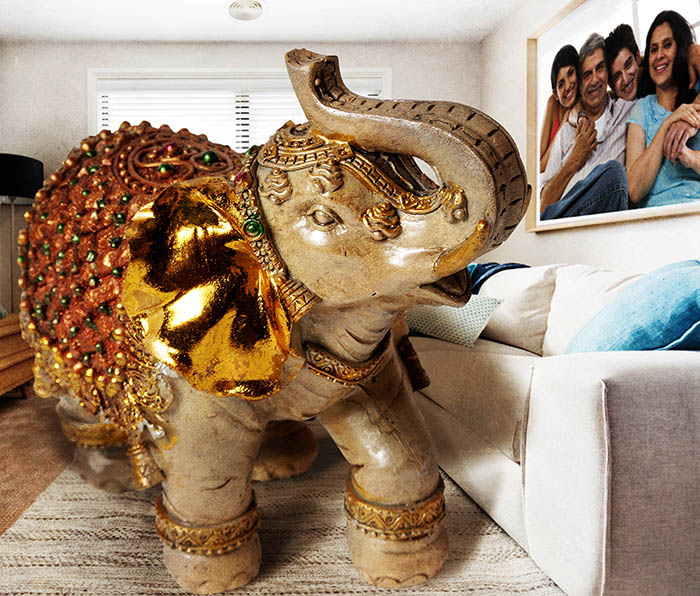
On Saturday 24 March the final performance of my play Elephant was cancelled in Birmingham, bizarrely the same city where, just over 13 years ago, my play Behzti was closed after protests against the show turned violent. Last month, a different kind of protest brought the run of Elephant to its premature end. The Football Lads Alliance were in town, apparently marching against “extremism” on the same day as the play’s final outing.
Elephant had completed a run in the Birmingham Rep’s studio space, The Door, and was on tour in the community. The last performance was for a closed group of visually impaired adults from a local charity and was scheduled to go on at the Old Joint Stock, a pub theatre in the city centre. However, because of the FLA demonstration, many local pubs, including the Old Joint Stock, which happened to be near the focal point of the rally, closed, following police advice.
The Rep found another location for the show, a large room at the theatre, but the charity did not feel safe bringing their group across town, such was the atmosphere of trepidation surrounding the march. With no audience, there was to be no show.
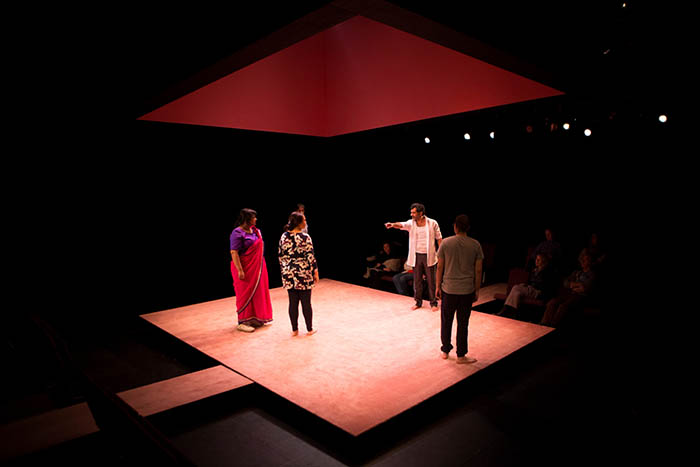
The cast of Elephant. Credit: Ellie Kurttz
Elephant was certainly not targeted like Behzti, it was simply collateral damage, as were the many businesses who lost significant income and the thousands of ordinary people who were intending to come into town to work and play in their city, but ended up changing their plans.
The FLA marching in Birmingham, a city defined by multiculturalism, was clearly an act of provocation. Everyone has a right to protest but the question here is about the policing of such action. The police facilitated the FLA and their cohort, most of whom came from outside the West Midlands, protecting their freedom to express their views. Afterwards the police framed the march as a success and Birmingham West Chief Superintendent Danny Long thanked the public for their understanding, saying: “Our aim was to facilitate the lawful protest and lawful assembly of all the groups here and that’s what’s happened.” Words which show little regard for the lawful freedoms of local people.
The clear message given out by the police was one of fear – keep a low profile and stay away, because today this is not your city. It’s a dysfunctional way of keeping order, one that we’ve got used to and don’t question. Peddling this type of fear gives credence to abhorrent views and fuels underlying tensions.
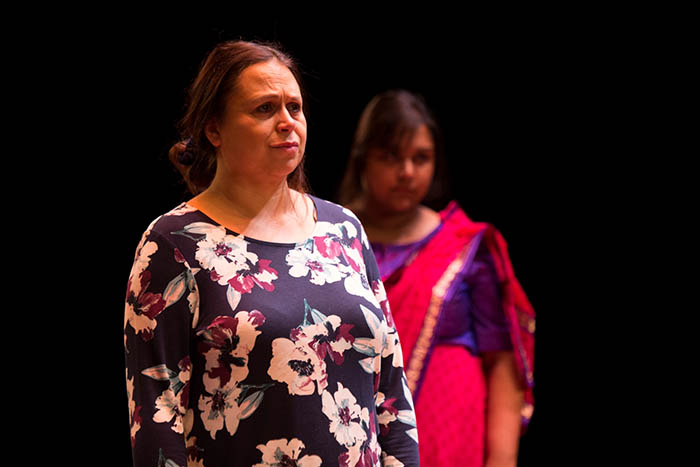
Yasmin Wilde as Deesh in Elephant. Credit: Ellie Kurttz
The West Midlands police have considerable form. Five years after Behzti was cancelled (the main reason being that because the police said they could not guarantee the safety of staff or public), Penny Woolcock’s film 1Day was removed from Birmingham cinemas after the same police force suggested it might incite gang violence. In 2010, during rehearsals of my play Behud, the police asked the Coventry Belgrade to pull the production, as they were expecting protests. The theatre refused and the show continued without incident.
Each of these situations tells us more about the police’s anxieties than our own. Given their attitude around the FLA march, there is clearly still much to learn about managing order in a city where almost half the population do not identify as white British. In her speech at the demonstration, the leader of far-right organisation For Britain, said: “We are living through a dark time in this country.” It’s a dark time indeed when the freedoms of racists brought in to intimidate and frighten a community, trump the freedoms of that very community to live their lives.
What happened in Birmingham last month raises questions of power and control. Who runs our cities and who are they for? The FLA march left a trace of unease and fracture in a city where many of its inhabitants already feel marginalised.
Elephant tells the story of a woman who is ostracised for telling the truth about being abused as a child. Although the circumstances of the play’s cancellation were totally different to Behzti in 2004, it’s hard not to feel a similar sense of sadness and loss at having been silenced.
Facilitating an inflammatory protest at the expense of the freedoms of the silent majority is no victory and shutting people out of their own city is no fit way of dealing with tensions between communities. Public order should be maintained in a fair and equal way, otherwise those who shout loudest get heard, and everyone else ends up without a voice.[/vc_column_text][vc_column_text]
[/vc_column_text][/vc_column][/vc_row][vc_row][vc_column width=”1/3″][staff name=”Gurpreet Kaur Bhatti on Behzti” profile_image=”100618″]When I started writing my third play, Behzti, in 2003 I could never have imagined the furore which was going to erupt. There was an atmosphere of great tension in the lead up to its production in December 2004, and it was indeed an extraordinary time. Mass demonstrations culminated in a riot outside the theatre. Read on[/staff][/vc_column][vc_column width=”1/3″][staff name=”Birmingham Repertory Theatre: Behzti” profile_image=”100620″]In December of 2004, Birmingham Repertory Theatre staged the world premiere of Behzti, a new play by Gurpreet Kaur Bhatti, in the smaller of its two theatres, The Door, which is a space exclusively dedicated to the production and presentation of new plays. “Behzti” is a word in common usage amongst the Punjabi speaking community meaning “dishonour” or “shame”. Read on[/staff][/vc_column][vc_column width=”1/3″][staff name=”Challenging the UK’s risk averse culture” profile_image=”100621″]It’s easy to dismiss the importance of arts in a democracy; its social value is disregarded when it is seen as the province of the rich and privileged. Yet when we look to more authoritarian regimes across the globe Index is reminded constantly of the importance of the role of arts as a voice of dissent and the extraordinary amount of time that repressive states spend suppressing it. Read on[/staff][/vc_column][/vc_row]